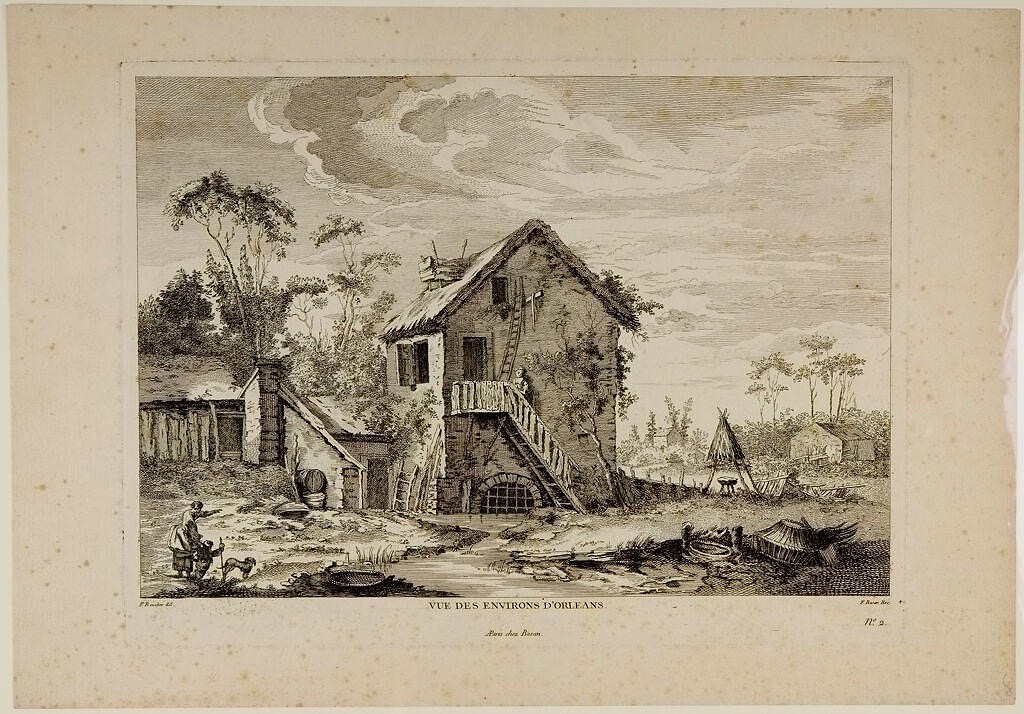ThePromisedLand

Pierre François Basan:
View in the Neighborhood of Orléans (18th century)
"When the school seems like the fanciest property in the whole precinct …"
As my old hometown transforms into a destination resort featuring innumerable wine-tasting rooms and new high-end restaurants, I spent an afternoon walking around the neighborhood where I grew up sixty and more years ago. Fortunately, I was born into a boom time, Post-War, filled with promise. Most houses were filled with families who kept them up, with few exceptions. Lawns were regularly mowed, shrubbery trimmed. I've said it before: I grew up in a Walt Disney® movie.
It's instructive to see what's become of all that promise. The small brick grade school was replaced by a brick behemoth oversized for its neighbors. Most of the houses survived, but few seem to be better for it. Many properties seem to be barely hanging on, neglected, and worn. A few seem downright dangerous. I had memories to guide me through this obvious dystopia. The wealth clearly fled to the newer neighborhood along the perimeter, leaving the past to try to sort out its future with sidewalks turning into sand and gravel, and rooflines sagging. This Eden at the End of the Oregon Trail looks more like the end of something else these days.
The Walt Disney® movie seems more like a documentary about poverty now. Some streets resemble what I might find in a New Mexican Pueblo, the poorest places I've ever visited. Yards gone to weeds or worse, fences far beyond ever being mended, streets patches upon patches at best, the native scrub prairie seems to be winning the entropy contest. A house I often visited when in grade school, one which I felt a little envious of, one where a friend's family moved and enthusiastically remodeled circa nineteen sixty, now features crumbling front steps and cheatgrass cascading thick over the perimeter retaining wall. My heart breaks to witness those dreams' fragility, short lives, and mysterious demise.
I wonder if any homeowner retains pride in their property, but I know poverty's influencing more. Urgency bleeds out after decades of unrelenting sameness. The homes of the cannery workers outlived the canneries. The wineries do not support a working class, their seasons lasting a few days instead of months, their labor demands modest, and their returns relatively enormous and more closely held. They produce unintended consequences. These invisible neighborhoods seem less inhabited. Indeed, the local school system recently closed a relatively new grade school due to inadequate enrollment. Few can afford to buy even these ramshackle dwellings, much less expect to raise a family.
This neighborhood used to quiver with kid energy. The place was buzzing with the mischief only kids have ever thought up. We knew every alley, every secret passageway. We'd had the geezers shake their fists at us for riding our bikes on the hoses and taking that irresistible shortcut across the corner of their property. The world seemed balanced then, though, in retrospect, it must have been balanced on the head of the usual pin. I know now where many of those stories ended: when families relocated, and the old folks moved to the Mt. View Cemetary to collect their permanent pensions. They left those damned kids on those bikes in charge, and we didn't do better than they had.
The Muse and I feel fortunate. We have a decent home. We stumbled into our advantage and didn't start knowing anything about what we eventually managed to master. I look backward with few regrets but many misgivings. If I lived on the other side of our precinct, I might be a manic MAGA maniac, more interested in getting payback than getting ahead. I might maintain a tumbledown shed of grudges in my sideyard and finally decide that mowing my lawn amounted to fruitless effort and quit. Only so much promise propels advancement: too little and one stalls. Too many promises without reward fuels grudges. The high cost of our recent successes seems hardly worth the considerable effort. It's formed a place with greater wealth and even greater poverty counterbalancing. When the school seems like the fanciest property in the whole precinct, people become suspicious of their government as well as their fellow man.
©2023 by David A. Schmaltz - all rights reserved


